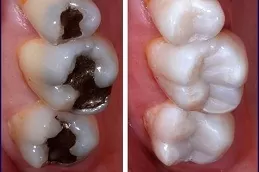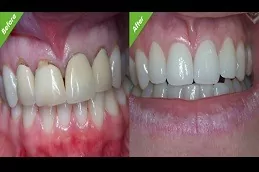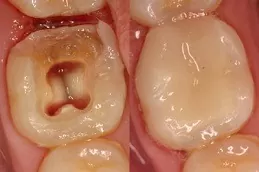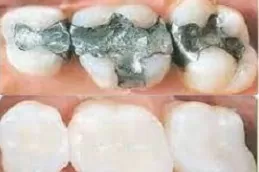What is the Root Canal Treatment?
The primary option for a tooth nerve infection is endodontic treatment, known as Root Canal Therapy (RCT). Root Canal Therapy eliminates the infected pulp and replaces it with an inert material.
Root Canal Therapy is highly successful. The only alternative to root canal therapy is tooth extraction, in which a bridge, implant, or denture can replace the tooth.
Results of Root Canal Georgia:
Root canal aims to save or repair a decayed and damaged tooth. The treatment is very successful; the procedure’s success rate is over 95%. Many teeth treated by a root canal can last a lifetime to save the tooth.
Candidates:
Anyone with a nerve infection is a candidate. Typically, the signs that you need the treatment include severe tooth pain, swelling in the gum, discoloration of teeth, and extreme sensitivity, to name a few.
If you have a serious pre-existing medical condition, let your dentist know. A Posterior Root Canal In Georgia can be performed on any person who is 12 years or older.
Get a Root Canal Treatment!
If you have an infection that needs treatment, do not hesitate to get an RCT to fill the root canals. The treatment will stop the spread of the disease and relieve the pain and swelling.
Pre-Procedure Care:
When you consult about the RCT, discuss your medical history. Also, let them know if you’re taking any medication and continue them while getting the treatment. Getting your teeth professionally cleaned is not a bad option since it will make your dentist’s job a lot easier.
Procedure:
Root Canal Treatment in Georgia & Tbilisi is a relatively intricate yet comfortable treatment. It works by removing the source of contamination and the decay inside the tooth. Patients are kept comfortable throughout the treatment with local anesthesia.
Here is the step-by-step process involved in root canal treatment in Georgia and Tbilisi.
Step 1: Diagnosis:
Your dentist will examine the teeth and take a couple of X-rays to gauge the tooth decay. Our experienced endodontist will use advanced X-rays and digital imaging to confirm whether they need a root canal procedure or not.
Step 2: Anesthesia:
Local anesthesia numbs the tooth and adjacent area before the treatment. Your dentist will then put on a dental dam, a small rubber-like material that separates infected teeth to keep them dry and clean.
This rubber sheet separates the tooth that needs root canal treatment by covering other teeth in your mouth.
Step 3: Removal of the Infected Pulp:
Next, the dentist drills a hole in the top of the tooth to remove the bacteria and the pulp. The drilling will help your dentist enter the pulp chamber and root inside the tooth.
The dentist will insert different files into the hole to reach the root tip and remove the infected root canals. The doctor uses a disinfectant to eliminate any leftover bacteria in the treated area.
Step 4: Filling and Restoring the Tooth:
Once the pulp chamber is dried and cleaned, your dentist will use a rubber-like material to fill the canal. This is not a temporary filling. It is placed inside the channel and heated. The dentist compressed it to help it fit against the walls.
Step 5: Fillings:
At your next appointment, the dentist will remove the temporary filling and put a permanent filling over the treated tooth.
After Care:
Avoid using the treated tooth for a bit, as you won’t feel any sensation in the treated area. After a few days of treatment, you can start chewing with it, though consult about the exact timelines.
A liquid or semi-solid diet that does not affect the treated tooth for a couple of days is helpful. The doctor may prescribe medication to overcome any temporary discomfort.
Be sure to follow any other directions from your doctor. Also, book a follow-up appointment to ensure your dentist can help you with a problem post-procedure.
Root Canal in Georgia FAQ’s:
Is A Crown Necessary After A Root Canal Procedure?
Generally, crowns are necessary after a Root Canal if the tooth under treatment is at the back of your mouth, i.e. a premolar, a molar, or one of the back grinding teeth. This is important as the teeth may become exposed to germs without the crown.
What Is Root Canal Treatment?
A Root Canal treatment is a treatment for the removal of infected pulp inside the teeth. The procedure involves drilling a hole in the tooth to reach the inside, removal of infected pulp, cleaning and disinfecting the inside to prevent future infection, filling the inside with dental fillings, and then adding a crown over the tooth to give it a sturdy structure.
Is Root Canal Treatment Painful?
As the procedure involves using locally administered anesthesia, the procedure itself is relatively painless, apart from the sting of the initial numbing injection, and is not much different, pain-wise, when compared with getting a filling.
How Long Does It Take To Recover From A Root Canal?
If performed by a certified endodontist specializing in Root Canal treatment and pain management, the recovery period usually lasts less than a week. In case you feel any unusual pain or discomfort, contact your healthcare provider immediately to avoid any complications.
Can I Eat After The Root Canal?
Yes, you can eat as soon as your anesthetic wears off. The tooth fillings usually harden an hour post-procedure but if the effects of anesthesia haven’t worn off before you start eating, there is a chance that you may bite your tongue or the inside of your cheek.
Can A Root Canal Be Done Without Anesthesia?
The pulp itself is composed of nerves and blood vessels meaning sharp pain will be experienced without the use of anesthetic to numb the surrounding tissue, except in rare cases where the tooth has completely died.
Should I Remove An Old Root Canal?
The best thing to do in case of pain or discomfort in an old Root Canal tooth is to consult your endodontist. He may recommend retreatment options or determine if you need another replacement crown.
Root Canal Treatment Specialists:
Our team of doctors is highly skilled and experienced in carrying out all kinds of dental procedures, including root canals. Our facility is state of the art, and our support staff is adept at modern dental techniques.
We offer the best dental services in the USA and ensure that all our patients are satisfied.
Book a Consultation!
For more details about Root Canal Treatment in Georgia & Tbilisi, or to book an appointment with one of our experts, fill in the form below. Someone from our team will reach out to you and set up an appointment at a time of your convenience. You can also have this consultation for free by having this treatment done with us.





